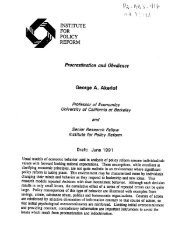SO 0\C)V'lQ " -- - usaid/ofda
SO 0\C)V'lQ " -- - usaid/ofda
SO 0\C)V'lQ " -- - usaid/ofda
Create successful ePaper yourself
Turn your PDF publications into a flip-book with our unique Google optimized e-Paper software.
40<br />
regulating immigration into Senegal and emigration from the<br />
country. The section on fertility legislation covers the<br />
status of women, marriage, family planning, children and child<br />
welfare, taxation, public welfare, inheritance, military<br />
service and penal institutions.<br />
B. Education and Training<br />
150. Billaz, R.; M.E. Chonchol; S. Sigal. Aspects Institutionnels de<br />
l'6cod6veloppement: Pedagogie du Milieu et Organisations<br />
Paysannes. Paris: Centre International de Recherche sur<br />
l'environnement et le D~veloppement, 1976, 161 p.<br />
This study presernts theoretical aspects of the equilibrium<br />
of eco-systems, the role of agricultural cultivation in rural<br />
development, and education for self-reliance. In this context,<br />
a case study from Senegal is presented which examines practical<br />
education at an agricultural training center. (Note: the case<br />
study presented in the discussion on peasant organizations is<br />
from Chile).<br />
151. Bordenave, Juan E. Diaz. "Pilot project in the use of communication<br />
media for adult education - Senegal." In: Communication and<br />
Rural Development, pp. 43-48. Paris: Unesco, 1977.<br />
Brief des'cription and evaluation of Senegal's rural radio<br />
and experimental television educational programs begun in the<br />
1960's. Citing the comparative successes and failures of each<br />
program, the author points out that any medium must be coupled<br />
with effective community organization.<br />
152. Bourgeois, M. "Attitudes et comportements de la population rurale<br />
senegalaise vis-a-vis des moyens audio-visuels de formation,"<br />
Tiers Monde 18(70) April-June 1977, pp. 381-396.<br />
Discussion of Senegal's rural radio program, as an effective<br />
instrument for training and rural development. Conceived<br />
as an exchange or dialogue between listeners and broadcasters,<br />
the fundamental aspects of the program are production, reception<br />
and listener control. Article focuses on the publication<br />
"Dissoo" which isa regular compilation of listener reaction<br />
to the program and is distributed to government officials, thus<br />
presenting them with a "barometer of the rural world." The<br />
program is seen as an instrument of reciprocal information and<br />
a mode of mass intervention for rural development.

















